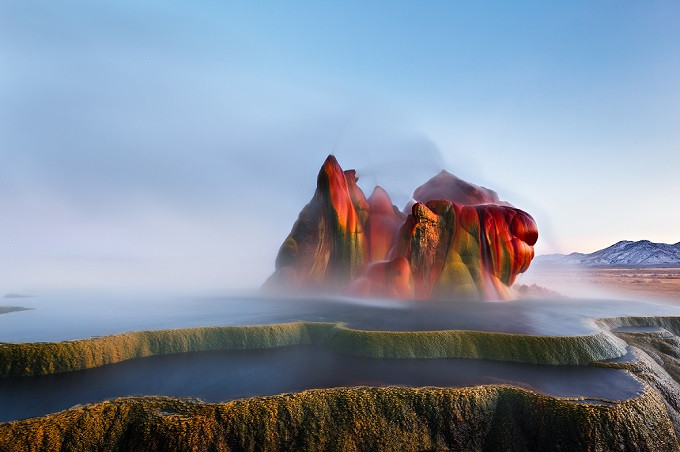
Ok, this geyser isn’t 100% natural, but it was formed by accident. In 1964 drilling for sources of geothermal energy caused minerals to rise up into the strange-but-true form you can still admire today.

This oddity is definitely all-natural. The hole, 300 meters across and up to 125 meters deep, is one of the best places on Earth for scuba diving.

The 16 Plitvice Lakes in Croatia are arranged in steps, linked by waterfalls. You can explore them on walkways like in the photo, or by boat.

The sandstone landforms of Zangye Danxia come in idiosyncratic and colourful formations, their layers revealing thousands upon millions of years of history and prehistory.

Antarctica pretty much has freehold on ‘out-of-this-world’ natural wonders, as long as you like your wonders to come in white, or maybe blue, or in some cases, stripes.

In a story that recalls the creation of the Fly Geyser, the Door to Hell in Turkmenistan’s Karakum Desert has been burning brightly for over 40 years, ever since geologists tried to burn off natural gases discovered when drilling at the site.

You’ve heard of the White Cliffs of Dover, but how about the ‘White Cliffs of Normandy’? The chalk-white Alabaster Coast stretches for 80 miles are rises in cliffs up to 100m high, forming odd structures like the arch at Étretat.

There is of course the much-more-famous Grand Canyon, but Bryce Canyon, sitting at over 2000 meters above sea level in Utah, is very much a wonder of the world with its pyramid-like rock formations. And it’s not actually a canyon.

Do not adjust your set. The largest salt lake in the world (covering 10,582 square kilometers, to be precise) resembles a mirror-smooth frozen lake, making possible perception-perplexing photos like this.

The surreal beauty of these mineral hot springs in Denizli Province in south-west Turkey draws so many tourists that access is now restricted in the hope that its natural wonder will be preserved for many more people to admire.
 5 Hidden Gems in Ireland that Most Tourists Miss
5 Hidden Gems in Ireland that Most Tourists MissA trip across the pond to Ireland is a dream come true ...